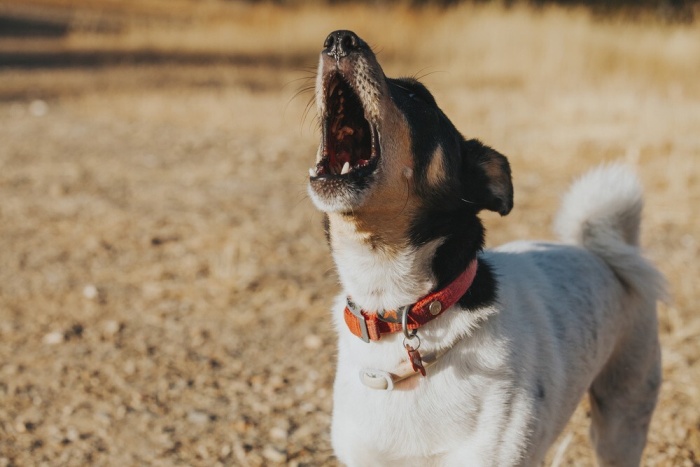Dogs are very resourceful when they want to communicate with humans. They show different behaviors. They may bark, whimper, or whine. Some dog owners find it confusing when their dogs keep on whimpering, and they don’t understand what it is trying to say. Thus, the question, why do dogs whine?
First things first, is Whining a negative behavior? Some pet owners try to pass it off and don’t try to understand what it is all about. It is a common behavior and can mean anything from wanting something to being excited.
But did you know that dogs’ whimpering can also be a sign of a serious health issue?
Dog experts agree that whining is one of the dog’s ways of communicating, and it is not always a negative behavior. Read on for more about why dogs whine and the possible solutions to correct this habit.
What is Dog Whining?
Experts suggest that whining is a common form of submission in dogs. Some pet parents view it as a negative behavior, but it may also indicate that the dog is in pain, frightened, or sick.
Whining is also a way for dogs to communicate their feelings. Your pet may be more vocal when they are anxious. Thus, dog owners should not always associate whining with negative behavior.
Keep in mind that dogs have limited ways of telling you what they want or need. Whining can mean various things, and dog owners often get frustrated when dogs keep doing it.
So, here are some common reasons why dogs whine. Let’s take a look at some of them.
Reasons Why Dogs Whine
1. Seeking Attention
Dogs are social animals who crave Attention and affection from their human family members. They will often whine when they sense that they are being ignored.
It is particularly true if you leave your dog home alone for an extended period, especially in a self-contained area. Your pet will indeed seek your Attention if they stayed in a spot without access to the family.
2. Trying to Communicate
Whimpering can also be a form of communication for some dogs. They do this when they want someone else to come for them. However, if you ignore the first few whines, your dog will stop doing it because they already told you the message and now expects you to act on it.
For instance, when your dog needs to pee and wants to go out, it will approach you and start whining. Your dog may pace at the doorway and wait for you.
3. Excited or Bored
On the other hand, some dogs will whine because they are excited or bored. When this happens, pet owners should stop doing and try playing with their dogs using toys.
You can also bring your pet to a dog park so they can mingle with other dogs. Don’t forget to take them for walks so that they can play with their friends and release some of their energy.
4. Trying to Say Sorry
Some dogs may whine when they want to say sorry, especially if you scold or punish them for doing something wrong. It can be an appeasement action, and their whining is their way to apologize for their unacceptable behavior.
If this is the reason for your pet’s whining, it may show other signs of remorse. Your pet may avoid eye contact, flattened ears, and tucked tail.
5. Your Pet May Be In Pain
Another reason why our dog keeps on whining and yelping is that it may be in pain. Your dog may look tough and strong, but they can be vocal when they feel pain.
Some dogs will be snappy and growl at you when you come close to the painful spot in their body. If you are not sure what is causing your dog’s pain, call your veterinarian immediately to determine their condition.

6. A Sign of Illness
If your dog is whimpering more than usual, it can be a sign of illness. Dogs that are feeling unwell will vocalize more constantly by whining or barking.
Check for other signs of illness such as lethargy, trembling, and diarrhea. Some painful conditions, such as ear infections, can make your dog cry in pain. On the other hand, some dogs tend to hide when they are not feeling well.
It is best to consult with your vet if you suspect that your dog’s whining is due to some illness.
7. Fear Whimpering
Dogs that feel scared may also whimper or whine. Fearful whining comes with actions such as panting, pacing, and trembling. Your dog may be anxious about something and is trying to let you know how they feel.
Check out your dog’s body language and recognize their fear and anxiety. If the whining and fearful behavior are sudden, it may also point to pain or medical issues.
Try to console your pet and reassure them that everything is alright. Your pet should recognize and trust that you will protect and keep them safe. Once they realize that you are their protector, your pet will relax and stop whining.
8. Depressed Dog
Excessive and persistent whining in some dogs may also show that they are depressed. A depressed dog may whine, howl, or become restless when the owner is not around.
On the other hand, some dogs show opposite signs of depression. Some may sleep more than usual or become unusually quiet.
Depression in dogs is more common than many of us think. Dogs feel the same emotions as humans, but they have limited ways of expressing them. Whining could be one of your pet’s ways to grieve or mourn when they feel sad or depressed.
9. Dementia Senior Dogs
Whimpering can also be a sign of confusion, especially for dogs who are seniors or suffering from dementia. Old dogs may forget routine activities, and they will try their best to remember by calling out or whining.
Senior dogs with dementia also experience anxiety, disorientation, changes in personality, and an increase in whining or pacing around the house.
10. Anxiety in Dogs
Anxiety can also be a reason why dogs whine. If your pet keeps on whining excessively for no apparent reason, then you should bring your pet to the vet. You may also do some research online about anxiety in dogs.
There are many reasons why dogs whine, and it is up to pet owners to understand their pets’ needs and act accordingly.
How to Stop Dogs from Whining?

There are several ways that you can stop dogs from whining. The key is to determine your pet’s needs and learn the reason behind the behavior before addressing it. Some people are okay with minimal whining, while others can’t stand the noise. Whining can be a sign or a form of communication. Some dogs would start whining suddenly, and it must be a sign of something else.
Here are some tips to help you and your dogs stop whining or whimpering.
- Please pay close attention to the sound of whining and other actions that accompanies it. Dogs exhibit a wide range of sounds, and the cause of their vocalization can vary. It would be best if you check for other signals that your pet is giving you. You will soon notice different volumes and pitches of whines for various reasons. Some dogs have a specific vocalization for when they want attention or something and when they are bored. Sudden and unusual whining may be due to pain, fear, or stress.
- Pay attention to what triggers your dog’s whining. When does it usually happen? Do some people make him whine more often than others? There are many reasons why dogs whine. Is his food bowl empty? Does he need a walk? Or is it time for his medication? These are just some of the many reasons why dogs whine.
- For fearful whining, anxious, or stressed dogs, try to find out what affects them. Once you determine the reason behind their fear or anxiety, work on training them and help your dog overcome its fear.
- Avoid encouraging the behavior, as it will be challenging to stop dogs from whining. If you are sure that your pet wants something such as food or attention, direct its behavior into something else before giving in. Tell it to sit or lie down. Only then should you reward it with praise, treat, or attention.
- If you are sure that there is no real need for your dog’s whining, it is best to ignore it. Ideally, you should respond selectively to your dog’s vocalization. If your pet is quiet, give it a treat, praise, or attention. You can also train your dog to respond on the quiet command with this.
It is a good idea to understand the reason behind your pet’s whining before deciding on how to address it. Try instituting some changes in your routines, such as feeding times, walks, and other activities that can help your dog feel less stressed or anxious about his environment. You should also address any underlying problems such as limited activity, lack of proper nutrition, and separation anxiety by providing needed exercise or medical attention when needed.
FAQs on Why Do Dogs Whine
Why do dogs whine when they are alone?
Dogs may start whining when left alone because of separation anxiety. They can also feel stressed out or bored when ignored and left all alone. If this is the case, then it would be best to leave them with a pet sitter who will play and interact with them so that even if you are away, they will still feel that there is a human presence in your absence.
Why do dogs squeak when they whine?
Dogs may make a “squeaking” sound while whining because it helps them draw more attention and create more of a fuss. If this happens, it would be best for owners to ignore the behavior and pay more attention to their dogs when they are quiet. Dogs will learn that making a fuss without much noise is not as effective as barking or whining with loud noises like squeaks.
Why do dogs whine when they see their owners?
Some dogs may be very excited to see their owners and, therefore, will make many noises that indicate excitement. It is best to allow your pet to act this way so that your dog will have no reason to continue being noisy because it gets its way. It is one way of shaping your pet’s behavior and making it easier to stop dogs from whining.
Why do dogs whine when they see other animals?
Some dogs may be very vocal towards other animals, especially if the first one is bigger than them or a dominant type. It would be best to ignore their dog’s whining and train them properly using the “quiet” command. This way, you can help your dog understand that this behavior is not accepted in certain situations, such as seeing other dogs or animals.
Conclusion
In most cases, pet parents can manage excessive whining through basic training, mental stimulation, and exercise. Knowing why dogs whine can help you find the best solutions and help improve your dog’s behavior.
Always be patient and consider that each dog has their way of communicating in different situations. You may need the help of your vet if it is due to pain or an underlying medical condition. Otherwise, you may consult with a trainer for behavior-led whining.
You may not completely correct this habit, but you can always try to lessen it to a more tolerable level. For most dogs, vocalization is still their primary form of communication.
RECOMMENDED POST:
- WHY DO DOGS WINK
- WHY DOGS BARKING AT NOTHING
- WHY DOGS BARKING AT NIGHT
- WHY DOGS FOLLOW YOU TO THE BATHROOM
- WHY DOGS LIKE STICKS